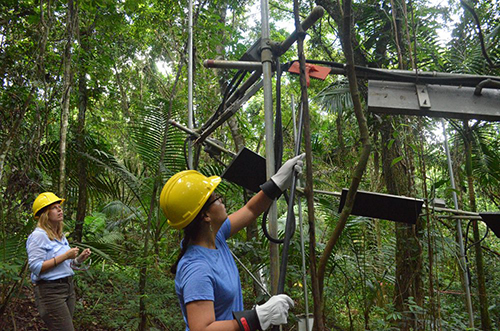Institute Research
Overview
The Institute's early research focused on reforestation, plantation forestry, tropical species identification, forest inventory methods, endangered species, and carbon sequestration. The 1920s saw the first lands added to El Yunque National Forest and the establishment of the initial long-term permanent plot studies.
In the 1930s and 1940s the Institute completed important silvicultural studies with rigorous controls to provide an important basis for tropical forest production. In the 1950s the ecology of natural, unmanaged forests was added and the 1960s saw endangered species research and ecosystem studies included in the program. Biomass and climate change research began in the 1980s and watershed and biogeochemical studies were in full swing by 1990.
Present Research and Focus Areas
Today, the Institute continues to build upon traditional research strengths, with research focused on forest ecology, disturbance ecology, ecosystem functions and services, urban ecology, watershed dynamics, migratory species, climate change, and policy science to better understand the effects of natural and human-induced pressures on tropical forests and the landscapes in which they are found. While adding new research emphases that focus on understanding structure and function of tropical wildlands at watershed and landscape scales, assessing the effects of climate and land use/land cover change on tropical ecosystems and biodiversity, and quantifying ecosystem goods and services from working lands where human and ecological systems interact.

 One of the TRACE warming plots in the Luquillo Experimental Forest, Puerto Rico. (Photo Credit: TRACE)
One of the TRACE warming plots in the Luquillo Experimental Forest, Puerto Rico. (Photo Credit: TRACE)
Further Reading about Institute Research
Learn about Research at the Sabana Field Research Station located in the Luquillo Experimental Forest.
Collaborative Programs:
The Caribbean Climate Hub
The Caribbean Climate Hub (CCH) is located in Río Piedras, Puerto Rico, and is one of ten Regional Hubs nationwide.
Learn more about the USDA Caribbean Climate Hub [External Site: Opens in New Window] and visit the Caribbean Climate Hub's local website [External Site: Opens in New Window]
Tropical Responses to Altered Climate Experiment
The Tropical Responses to Altered Climate Experiment (TRACE), is the the first-ever warming experiment to be conducted in a tropical forest ecosystem.
Learn more about the TRACE Forest Warming project [External Site: Opens in New Window]
San Juan Urban Long-Term Research Area
San Juan Urban Long-Term Research Area (ULTRA) is a collaborative research network composed of multiple academic institutions, public agencies, non-profit partners, and community leaders, which seeks to conduct and support research about the city of San Juan as a social-ecological system.
Learn more about the San Juan Urban Long-Term Research Area [External Site: Opens in New Window]
Luquillo Critical Zone Observatory
Luquillo Critical Zone Observatory (LCZO) is located in the Luquillo Mountains of northeastern Puerto Rico.
Learn more about the Luquillo Critical Zone Observatory [External Site: Opens in New Window]
Luquillo Long Term Ecological Research
Luquillo Long Term Ecological Research (LTER) goal is to determine how changing climate and disturbance regimes interact to drive ecological change in natural and human modified landscapes in tropical montane ecosystems.
Learn more about the Luquillo Long Term Ecological Research [External Site: Opens in New Window]
Forest Inventory and Analysis
Forest Inventory and Analysis (FIA) Program of the U.S. Forest Service provides the information needed to assess America's forests.
Learn more about the Forest Inventory and Analysis Program [External Site: Opens in New Window]
National Ecological Observatory Network
National Ecological Observatory Network (NEON) is a continental-scale observation system for examining ecological change over time.
Learn more about the National Ecological Observatory Network [External Site: Opens in New Window]
Page last modified: 01/04/2022


